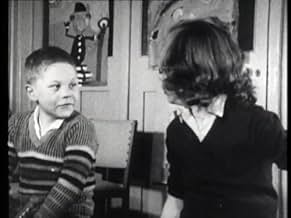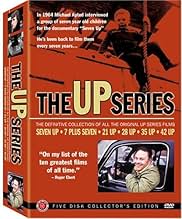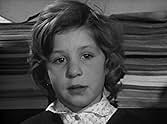Seven Up!
- Episode aired Nov 1984
- 40m
IMDb RATING
7.9/10
4.6K
YOUR RATING
Seven year old children from various backgrounds are interviewed on their hopes and aspirations for the future. It is hoped to follow them up in the year 2000 and see how things turned out.Seven year old children from various backgrounds are interviewed on their hopes and aspirations for the future. It is hoped to follow them up in the year 2000 and see how things turned out.Seven year old children from various backgrounds are interviewed on their hopes and aspirations for the future. It is hoped to follow them up in the year 2000 and see how things turned out.
- Awards
- 1 nomination total
Douglas Keay
- Self - Narrator
- (voice)
Bruce Balden
- Self
- (as Bruce)
Jacqueline Bassett
- Self
- (as Jackie)
Symon Basterfield
- Self
- (as Simon)
Andrew Brackfield
- Self
- (as Andrew)
John Brisby
- Self
- (as John)
Suzanne Dewey
- Self
- (as Suzy)
Charles Furneaux
- Self
- (as Charles)
Nicholas Hitchon
- Self
- (as Nicholas)
Neil Hughes
- Self
- (as Neil)
Lynn Johnson
- Self
- (as Lindsay)
Paul Kligerman
- Self
- (as Paul)
Michelle Murphy
- Self
- (as Michelle)
Susan Sullivan
- Self
- (as Susan)
Tony Walker
- Self
- (as Tony)
Derek Cooper
- Narrator
- (voice)
- (uncredited)
Peter Davies
- Self
- (uncredited)
Wilfrid Thomas
- Narrator
- (voice)
- (uncredited)
Featured reviews
I get most all of my films by recommendation and this is universally the most recommended to me of those I haven't seen. The series I mean. I suppose it wouldn't make any sense at all to see them out of order so as with everyone, we all start here.
To do that, we have to place ourselves in several other worlds. I'm an American. Though I spent a few years in school in the UK, We came home when I was five and I have few memories. For Americans, England at least the pre-Thatcher England was a sort of fairy- tale place where privilege was sprinkled here and there and strongly supported on the backs of the relatively poor remainder because by such tax they helped define what it meant to be British.
There aren't many blanket statements that can be made of the US and this is less true now but it is still true that Americans define themselves in large measure against this tradition. The idea of class immobility seems a perversion of nature.
Naturally, that's at the center of how this experiment starts. I'm sure the filmmakers never intended to follow these children as markers (more than representatives) of the collapse of privilege. Not the injustice and wealth, but the willingness which Brits poured into protecting a country (twice!) against barbarians so that their rich could continue pulling the traditions along.
So start here, fellow voyager. This first installment is completely without merit except in how it sets the starting point for a voyage through the transformation of an old two-class system to a "modern" two-class one, seemingly only for the amusement of the rest of the world.
Perhaps it would have been more interesting to have selected all girls.
Ted's Evaluation -- 3 of 3: Worth watching.
To do that, we have to place ourselves in several other worlds. I'm an American. Though I spent a few years in school in the UK, We came home when I was five and I have few memories. For Americans, England at least the pre-Thatcher England was a sort of fairy- tale place where privilege was sprinkled here and there and strongly supported on the backs of the relatively poor remainder because by such tax they helped define what it meant to be British.
There aren't many blanket statements that can be made of the US and this is less true now but it is still true that Americans define themselves in large measure against this tradition. The idea of class immobility seems a perversion of nature.
Naturally, that's at the center of how this experiment starts. I'm sure the filmmakers never intended to follow these children as markers (more than representatives) of the collapse of privilege. Not the injustice and wealth, but the willingness which Brits poured into protecting a country (twice!) against barbarians so that their rich could continue pulling the traditions along.
So start here, fellow voyager. This first installment is completely without merit except in how it sets the starting point for a voyage through the transformation of an old two-class system to a "modern" two-class one, seemingly only for the amusement of the rest of the world.
Perhaps it would have been more interesting to have selected all girls.
Ted's Evaluation -- 3 of 3: Worth watching.
I've read about this series elsewhere and was always curious to see it. Thanks to an internet movie rental chain I've now seen 7 Up and 7 + 7, and the rest of the series is queued up and ready to ship. I can't wait.
Viewers who are not used to the various English accents will likely be struggling to understand what some of the kids are saying in the first movie, 7 Up, but it's a short film, and deserves repeated viewing. My vague memories of previous reviews of this series suggest that this may be the most lighthearted of the series. While it is fascinating for many reasons, it is also vastly enjoyable just for the experience of the 7 year-olds' high spirits and humor.
It's jarring when you get your first look at 7 + 7, which revisits most of the kids 7 years later. Their individuality, only hinted at in the first movie, is obvious in these now-14 year-olds. As a parent I feel that familiar combination of the sadness at the loss of the child and anticipation of the future adult. Here we run through this in a matter of minutes.
As it stands now, the series goes as far as 42 Up, somehow turning these frolicking little kids into my peers in the space of a few hours. (I've always been a sucker for special effects.) This series is unlike anything that came before it, and while a quick scan of titles suggests that it's been imitated since, I'm waiting to see what happens to this particular group.
Viewers who are not used to the various English accents will likely be struggling to understand what some of the kids are saying in the first movie, 7 Up, but it's a short film, and deserves repeated viewing. My vague memories of previous reviews of this series suggest that this may be the most lighthearted of the series. While it is fascinating for many reasons, it is also vastly enjoyable just for the experience of the 7 year-olds' high spirits and humor.
It's jarring when you get your first look at 7 + 7, which revisits most of the kids 7 years later. Their individuality, only hinted at in the first movie, is obvious in these now-14 year-olds. As a parent I feel that familiar combination of the sadness at the loss of the child and anticipation of the future adult. Here we run through this in a matter of minutes.
As it stands now, the series goes as far as 42 Up, somehow turning these frolicking little kids into my peers in the space of a few hours. (I've always been a sucker for special effects.) This series is unlike anything that came before it, and while a quick scan of titles suggests that it's been imitated since, I'm waiting to see what happens to this particular group.
"Seven Up!" is the forty minute documentary from 1964 that stands as a prologue for the most forward thinking documentary series of all-time. The film brings together a group of surprisingly articulate seven-year-olds from a variety of backgrounds in England. Through a number of questions posed to each of the children, the audience gets the opportunity to get to know the world through these children's eyes, and often presumably through the parent's eyes and therefore only quoted through these children. Personalities more than perspectives ring through the strongest in this first film, and the glimpse at the education system circa 1964 is intriguing. Unfortunately, as "characters" that will ultimately be seen for another forty years to come, the thick accents of some of them make for a rough start. All in all this is important cinema regardless.
Michael Apted must be congratulated for having (or perhaps stumbling upon) the vision for this study. Take 14 seven year olds in England, film them in a few interesting situations, and follow those same kids as they grow up. Every seven years. Because all of our lives transpire at roughly the same rates, we cannot actually observe children growing up. But this filmed approach is the next best thing.
This first film is rather short, and in black and white plays about like an amateur home movie. We still get to see and hear these children, their opinions, their likes and dislikes, their ambitions. And, while it is interesting, you can get the same thing at any elementary school playground. What is really interesting, and groundbreaking, is the following these children as they grow up.
For that, one must see the next installments. The best way, for the uninitiated, is the 5-disk DVD set just out, which has all 6 films up through "42 UP" in 1998. ("49 UP" has been made but is not yet available on DVD.) However, simply seeing the most recent film is pretty good, because each film contains snippets of each of the former ones, allowing us to see how each child developed in 7-year increments.
Just a marvelous study of growing up.
This first film is rather short, and in black and white plays about like an amateur home movie. We still get to see and hear these children, their opinions, their likes and dislikes, their ambitions. And, while it is interesting, you can get the same thing at any elementary school playground. What is really interesting, and groundbreaking, is the following these children as they grow up.
For that, one must see the next installments. The best way, for the uninitiated, is the 5-disk DVD set just out, which has all 6 films up through "42 UP" in 1998. ("49 UP" has been made but is not yet available on DVD.) However, simply seeing the most recent film is pretty good, because each film contains snippets of each of the former ones, allowing us to see how each child developed in 7-year increments.
Just a marvelous study of growing up.
I was interested to hear an interview with Michael Apted. I learned that the children selected at age 7 were those who were articulate and able to communicate clearly. The heads of various schools were asked to select their brightest and best for the project. As a social commentary, it is very interesting to see how they have developed over the years. Also, the various opinions and levels of participation from those around them, for example wives and husbands. By their very participation and reflection during the filming the participants have been altered. Clearly one participant felt quite misrepresented and wanted to set the record straight. In that sense, the film makers are not passive observers and some bias is inevitable. Despite this, it is a convincing personal commentary on more than 4 decades of British life.
Did you know
- TriviaAs this was originally conceived as a one-off, no long term contracts were drawn up with the documentary participants. The interviews since Seven Up! have been voluntary, but Michael Apted says the participants are paid for their appearance in each film, as well as equal parts of any prize the film may win.
- Quotes
Neil Hughes: When I get married I don't want to have any children because they're always doing naughty things and making the house untidy.
- Crazy creditsVoice-over during final credits: "If you want to see what happens to these children, look in at Granada Television on Tuesday, May the second ... in the year 2000."
- ConnectionsEdited from World in Action (1963)
Details
- Release date
- Country of origin
- Official site
- Languages
- Also known as
- 7 Up
- Production company
- See more company credits at IMDbPro
- Runtime
- 40m
- Color
- Sound mix
- Aspect ratio
- 1.33 : 1
Contribute to this page
Suggest an edit or add missing content






















